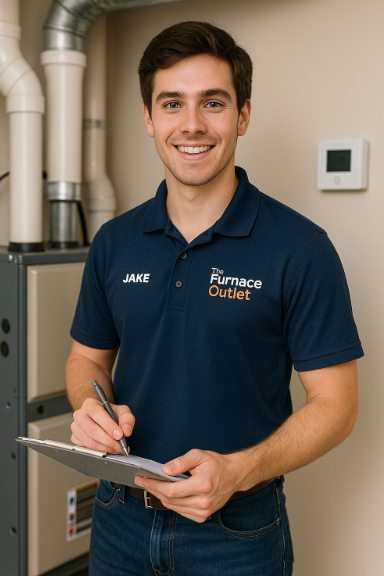When it comes to keeping your home comfortable year-round, choosing the right HVAC system is crucial. While electric and natural gas units are common, propane HVAC systems offer unique benefits that make them a smart choice for many homeowners. From efficiency to reliability, propane-powered heating and cooling solutions are gaining popularity across the country.
For those looking for a dependable system, this Goodman 3 Ton 14.5 SEER2 R-32 Bundle is an excellent example of how advanced HVAC units can combine comfort, efficiency, and versatility.
What Is a Propane HVAC System?
A propane HVAC system uses propane gas as the primary fuel source for heating while providing cooling through integrated air conditioning. These systems typically include a propane furnace or heater, an air conditioner or heat pump, and an air handler to circulate conditioned air throughout your home.
Unlike electric furnaces that rely on resistive heating or heat pumps that depend on outside air temperatures, propane furnaces burn clean fuel to produce heat efficiently. This makes them ideal for colder climates, where other systems may struggle to maintain warmth.
How Propane HVAC Systems Work
Propane heating systems work by burning propane fuel in a controlled combustion chamber. The heat generated warms the air, which is then distributed through your home via ductwork or a ductless system. When paired with an air conditioner, the same system can provide cooling during the warmer months.
A propane heater and air conditioner can operate as a single unit or as part of a hybrid system with a heat pump. Hybrid setups optimize energy efficiency by letting the heat pump handle moderate heating needs while propane takes over during extremely cold temperatures.
Advantages of Propane HVAC Systems
1. High Efficiency
One of the biggest benefits of a propane HVAC system is its efficiency. Propane furnaces can achieve heating efficiency ratings up to 98%, meaning almost all the fuel is converted to usable heat. According to the U.S. Department of Energy, higher efficiency not only lowers energy costs but also reduces the environmental impact of your heating system.
2. Cost Savings
Though the initial installation cost of a propane system may be higher than standard electric units, the operational savings often offset the upfront expense. Propane tends to be less expensive than electricity in many regions, and the fast, effective heating reduces energy consumption. For a detailed cost comparison, check out this Propane vs Electric Heating Guide.
3. Reliability in Cold Weather
Propane furnaces maintain their efficiency even in extremely low temperatures, unlike some heat pumps whose performance can drop when the outside air is cold. This makes propane systems a dependable choice for areas with long, harsh winters.
4. Environmentally Friendly
Propane is a clean-burning fuel, producing fewer greenhouse gases than oil or coal. The Propane Education & Research Council highlights propane as a renewable, low-carbon heating option, making it a greener alternative to traditional fossil fuels.
Considerations Before Installing a Propane HVAC System
While propane systems offer many advantages, there are some factors homeowners should consider:
-
Propane Availability: Ensure propane delivery services are accessible in your area. Rural homes may require regular deliveries and proper tank storage.
-
Storage Requirements: Propane tanks must be installed safely and comply with local codes.
-
Installation Costs: Upfront expenses can be higher than electric systems, though long-term savings usually compensate.
-
Maintenance Needs: Annual inspections and regular maintenance by a licensed technician are essential to keep your system running efficiently.
Hybrid Propane Systems: The Best of Both Worlds
A hybrid system combines a propane heat pump with a standard propane furnace. The heat pump handles heating and cooling when outdoor temperatures are moderate, while the propane furnace takes over in extreme cold. This combination maximizes efficiency and comfort throughout the year.
For those interested in hybrid solutions, this Kauffman Gas article on heat pump and propane furnace systems provides a detailed guide on the pros and cons of combining both technologies.
Choosing the Right Propane HVAC System
Selecting the appropriate propane HVAC system involves considering:
-
Home Size: Larger homes may require higher-capacity units to maintain comfort.
-
Climate: Colder regions benefit more from propane systems due to their consistent heating performance.
-
Budget: Factor in installation costs, propane supply, and long-term energy savings.
Consulting with a professional HVAC contractor ensures your system is correctly sized and optimized for your home.
Maintenance Tips for Propane HVAC Systems
To maximize the lifespan and efficiency of your propane system, follow these tips:
-
Schedule Annual Inspections: Have a qualified technician inspect the system yearly.
-
Change or Clean Filters: Regularly replace or clean air filters to maintain airflow.
-
Check for Leaks: Inspect for propane leaks and address any issues immediately.
-
Monitor Tank Levels: Keep an eye on your propane supply to avoid running out during peak usage.
Conclusion
A propane HVAC system offers an efficient, reliable, and eco-friendly way to heat and cool your home. Whether you choose a standalone propane furnace, a combined heater and air conditioner, or a hybrid system with a heat pump, propane provides consistent comfort throughout the year.
For those looking to upgrade or replace their HVAC setup, exploring propane options is a smart move. Consider consulting an HVAC professional to determine the best solution for your specific home and climate.







